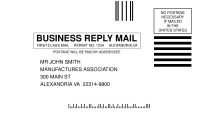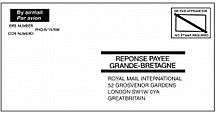Freepost
Freepost is a postal service provided by various postal administrations, whereby a person sends mail without affixing postage, and the recipient pays the postage when collecting the mail. Freepost differs from self-addressed stamped envelopes, courtesy reply mail, and metered reply mail in that the recipient of the freepost pays only for those items that are actually received, rather than for all that are distributed.
.jpg)
Uses
In one typical use of freepost, a business sends bulk mail to potential customers, the bulk mail including envelopes or postcards that potential customers can return to the business by freepost. In another typical use, magazines include subscription cards that potential subscribers can return by freepost. In yet another typical use, a seller can provide a merchandise return label bearing the appropriate freepost indicia (as described below) to a customer so that the customer can return the item to the seller by freepost upon issuance of a Return Merchandise Authorization.
A non-commercial usecase would be to return lost items belonging to some business: the item will have printed on the back "if found please return by freepost to <address>". For example, UK's NHS worker's RFID access cards can be returned by freepost if lost & found.
By country
Australia
In Australia, freepost is called Reply Paid. Specially printed envelopes are used, with the permit holder's address, the words "Reply Paid" with an authorization number. The stamp is replaced by three black stripes. The permit holder pays the postage plus a fee to the postal authority. The customer may write the Reply Paid envelope out by hand.[1]
- Centrelink Australia,
- REPLY PAID# 7800,
- CANBERRA BC, ACT, 2610,
- AUSTRALIA
An important customer like the Taxation Office would have an RP number the same as the post code, to minimize errors even more.
- Wiki Foundation
- Reply Paid 1435
- Wherever NSW 1435
Canada
To coordinate service with the United States, Canada Post uses the same terminology and the same standards as the USPS (as explained below), with the exception of the use of Canadian Postal codes.
United States

In the United States, the United States Postal Service refers to freepost as business reply mail. A mailer wishing to receive mail by freepost must obtain a business reply permit and design the envelopes, postcards, or labels according to the standards specified by the USPS, including the use of an appropriate FIM B or C code. The address on the envelope, postcard, or label is the same as the address for regular mail, except that the ZIP+4 code is different. In some large cities, business reply mail has its own five-digit ZIP code or codes (e.g., 20077 and 20078 in Washington, D.C.). The envelope or postcard also includes space for the business reply permit number.
United Kingdom and New Zealand
In the UK and NZ, freepost envelopes can be hand addressed by the sender; this simply requires including the word ‘FREEPOST’ and the recipient's permit number as part of the address. (This technique can not be used to send mail to merely anyone, who would then have to pay for it; the permit number and the recipient address must match for the recipient to be billed.) [2]
The Netherlands
In the Netherlands, freepost is addressed exactly the same as normal mail. The recipient needs a special address: an answering number (antwoordnummer in Dutch). The sender can distinguish these addresses because they include the word 'antwoordnummer' and may choose whether or not to use a stamp. When no stamp is used, the recipient pays the costs plus a fee, but when the sender uses a stamp, no extra costs are made.
Finland
In Finland, there are two types of freepost. In the first one, which is used on orders that a company has sent and the customer wants to return it (for example, an order from an e-commerce store), the customer can use the same envelope the company sent and simply write PALAUTUS or ASIAKASPALAUTUS ('RETURN' or 'CUSTOMER RETURN'). The company must have a contract with the Finnish postal service Itella.
The other option is to use following form:
- Company name
- Tunnus: 12345
- 00003 VASTAUSLÄHETYS
Where tunnus means 'code' and vastauslähetys means 'return delivery'. Postal code is always same for these deliveries. There is usually some text indicating that postage is paid on the upper-right corner. (where stamp would be located) Companies can, however design this text, or image, themselves to match the company logo instead of using the standard one. The company must also have contract with Itella. The address may be handwritten by the customer.
More generally
Other countries use freepost as well, although the envelope designs required by those countries' postal authorities differ widely from that described above. A freepost address may have a special freepost number for use along with, or instead of, the address for regular mail.
International Business Reply Service (IBRS)

International freepost also exists and is known variously as ‘International Business Reply Service’, ‘International Business Reply Mail’, 'International Business Response Service', 'IBRS' and, in French, "Correspondance Commerciale-Réponse Internationale" (CCRI). Like USPS business reply mail, international business reply mail must conform to certain format requirements, including the prominent notice "REPONSE PAYEE" (French for "reply paid"), and a number indicating the account that will pay for the postage.[4][3] International Business Reply Service is a convenient way for international customers to reply to the sender with pre-paid cards and envelopes, at no cost to them.
References
- "Reply paid at a glance" (PDF). AusPost. Retrieved 17 December 2018.
- "UK Freepost rules". UK Royal Mail. Retrieved 22 March 2011.
- "International Business Reply Service".
- USPS (2010). "International Mail Manual". Retrieved September 2, 2011, §382.
External links
- Information on reply paid from Australia Post
- Information on business reply mail from the USPS
- Return and Reply Mail (Mailpiece Quality Control Program, chapter 9), a USPS document showing the design of business reply mail in the United States